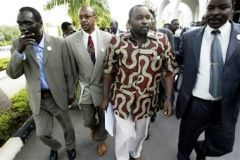Darfur holdout rebels face uncertain future
May 18, 2006 (ABUJA) — Rebel leaders from Sudan’s Darfur region who have refused to sign a peace agreement with the government face an uncertain future, with no clear fall back plan and the threat of sanctions hanging over them.
 Two rebel groups who rejected a May 5 peace deal, signed by the Khartoum government and one larger rebel faction, have until May 31 to join the agreement.
Two rebel groups who rejected a May 5 peace deal, signed by the Khartoum government and one larger rebel faction, have until May 31 to join the agreement.
The international community sees the peace agreement as the only hope of ending a war that has killed tens of thousands of people, but diplomats fear the accord will not stop the violence if only one rebel faction supports it.
Already, refugees have rioted against the deal in several Darfur camps. Many said the accord was incomplete, imposed by foreigners and not strong enough to protect them.
The African Union (AU), which mediated the peace talks, has threatened to request U.N. sanctions such as travel bans or a freeze on assets against the holdout rebel leaders unless they sign the agreement before the deadline.
Intense pressure is focused on Abdelwahid Mohamed al-Nur, leader of a faction of the Sudan Liberation Army (SLA). Nur is weak militarily but diplomats are desperate for his endorsement because he represents Darfur’s largest tribe, the Fur.
The SLA and a smaller rebel group, the Justice and Equality Movement (JEM), took up arms in early 2003 accusing the Arab-dominated central government of neglecting Darfur, an ethnically mixed region the size of France in western Sudan.
Khartoum enlisted Arab Janjaweed militias to crush the rebellion. The ensuing campaign of murders, rape, looting and arson drove 2 million people from their homes into camps.
“NOWHERE TO GO”
Nur has spent much of the past two years in the Nigerian capital Abuja, where the peace accord was negotiated, but on Thursday he and his advisers were dispersing and had no clear strategy from now until May 31.
“He really should realise that he has everything to gain by signing, and if he doesn’t he’ll find he has no friends, no money and nowhere to go,” said one diplomat who has been closely involved in the push to persuade Nur to sign.
Nur wants Khartoum to meet three key demands in an annex accord before he signs. The demands are for greater compensation for victims of the war, more political posts for the SLA and greater involvement in disarming the Janjaweed. But the government has already rebuffed him.
Nur says he is committed to a ceasefire and diplomats say he accepts there is nothing to be gained through fighting. They say the risk is not so much that he will cause havoc, but rather that his stance will undermine the deal in the eyes of the Fur.
The other holdout leader is Khalil Ibrahim of the JEM, and his position appears even more precarious. Ibrahim has few fighters and his support in Darfur has dwindled. The movement survives mainly on funding from Islamist networks.
Ibrahim has used Chad, where President Idriss Deby is a tribal ally, as a base, but that could be about to change.
“Deby told Khalil that if he does not sign by May 31, he must leave Chad because the AU and U.N. are sanctioning non-signatories. Khalil was surprised,” said a Western diplomat in the Chadian capital N’Djamena.
Deby is battling rebels on his own turf in a crisis that is interlocked with the Darfur conflict. He accuses the Sudanese government of backing the Chadian rebels — a charge Khartoum denies — while some Darfur rebels have rallied around Deby.
Minni Minawi, head of the SLA faction that signed the May 5 peace deal, is in N’Djamena where he has succeeded in winning Deby’s support for the accord, diplomats say. He is now preparing to go to Darfur to try and widen support for it there.
(Reuters)
